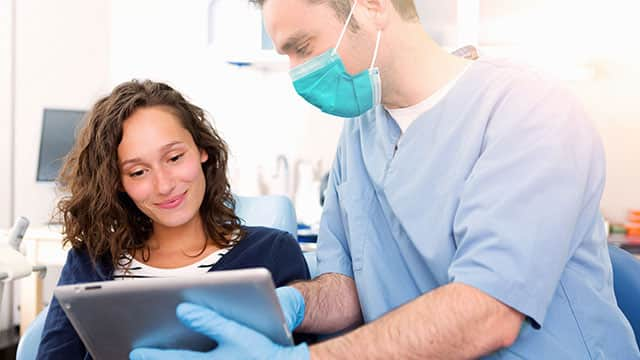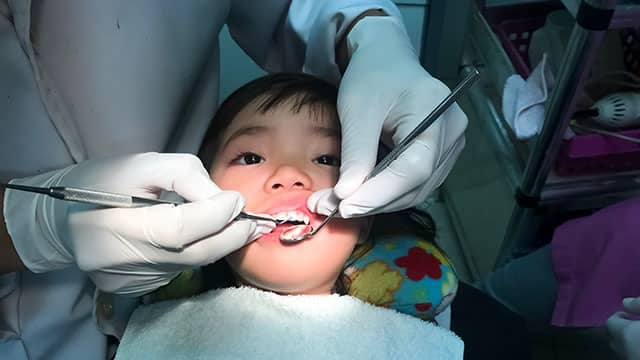Did you know that oral cancer screenings can be as quick as brushing your teeth? As noted by the Mouth Cancer Foundation, a comprehensive screening takes less than two minutes! The definition of mouth cancer is any cancer in the mouth (oral cavity). There are different areas of the mouth you probably haven't considered that a dentist or dental hygienist will inspect. The screening covers your oral cavity and connected tissues, which can even be in the throat, sinuses, larynx, and pharynx. An oral cancer screening can reassure you that there are no apparent problems or trigger early treatment if there are. The term "oral cancer screening" is interchangeable with "mouth cancer screening," as you could hear both from your dental professional. There are two main aspects of mouth cancer screenings. Let's dive in!
Visual Exam
If you have dentures or other removable dental appliances, take them out before your screening. This ensures that your dentist can examine your entire mouth. Your dental professional will be looking for asymmetries, swellings, bumps, patches of color, ulcerations, or other abnormalities. They will be observing your face, neck, lips, jaw, cheeks, inside of your nose and oral cavity, all significant parts of screening for oral cancer.
To look inside your mouth, your dental professional uses a light and mirror. They also use a tongue depressor to hold down your tongue and look at the back of your mouth – much like your average physical. And like you learned from your childhood physical, your dental professional will ask you to stick your tongue out and say "Ahh" to expose areas in your throat that are otherwise difficult to see.
Physical Exam
Besides a visual exam, your dental professional will touch your face, mouth, and neck to feel for unusual nodules or masses. Touch is imperative for them to find any cancer-causing abnormalities in your mouth, as noted by the Oral Cancer Foundation (OCF). A tactile inspection helps your dental professional find any hard lumps of tissue. While oral cancer symptoms can sometimes be painful, it is usually painless in its early stages. This is even more of a reason for dental professionals to screen for it regularly.
Oral Cancer Screening Devices
Your oral care provider may use specialized examination tools to complete an oral cancer screening. These include:
- An oral brush biopsy, which painlessly removes cells for testing
- An enhanced oral assessment system tool to identify suspicious oral tissues with a fluorescent light
- An oral lesion screening that uses a mouth rinse to help with the visual inspection of your mouth's tissues
After Your Oral Cancer Screening
An oral cancer screening is precautionary, not diagnostic. Suppose your dentist or dental hygienist finds nothing abnormal during the exam. That's great news! In that case, you should return at regular intervals for further screening. It's imperative to keep up with dental and dental hygiene appointments, especially if you have risk factors for developing oral cancer. As noted by the American Cancer Society, top risk factors include:
- Tobacco use
- Alcohol use
- An HPV diagnosis
- Sun exposure
- Age (55+)
- Gender (it is twice as common in men than in women)
If your dental professional does find an oral cancer-like symptom, they may refer you for further testing to get to the bottom of what that symptom means. Keep in mind, results that need further investigation are not necessarily a cancer diagnosis. If you do find cancer, early diagnosis reduces treatment-related health problems down the road. That's why prevention and early detection are key!
A screening for oral cancer is not only a physical exam. It's an opportunity for you to speak with your dental professional about fears and concerns surrounding mouth cancer. You should come prepared with questions and seek advice for lifestyle changes. It's completely normal to be nervous about the idea of oral cancer, but regularly participating in this quick screening will help put your mind at ease!
This article is intended to promote understanding of and knowledge about general oral health topics. It is not intended to be a substitute for professional advice, diagnosis or treatment. Always seek the advice of your dentist or other qualified healthcare provider with any questions you may have regarding a medical condition or treatment.
ORAL HEALTH QUIZ
What's behind your smile?
Take our Oral Health assessment to get the most from your oral care routine
ORAL HEALTH QUIZ
What's behind your smile?
Take our Oral Health assessment to get the most from your oral care routine















